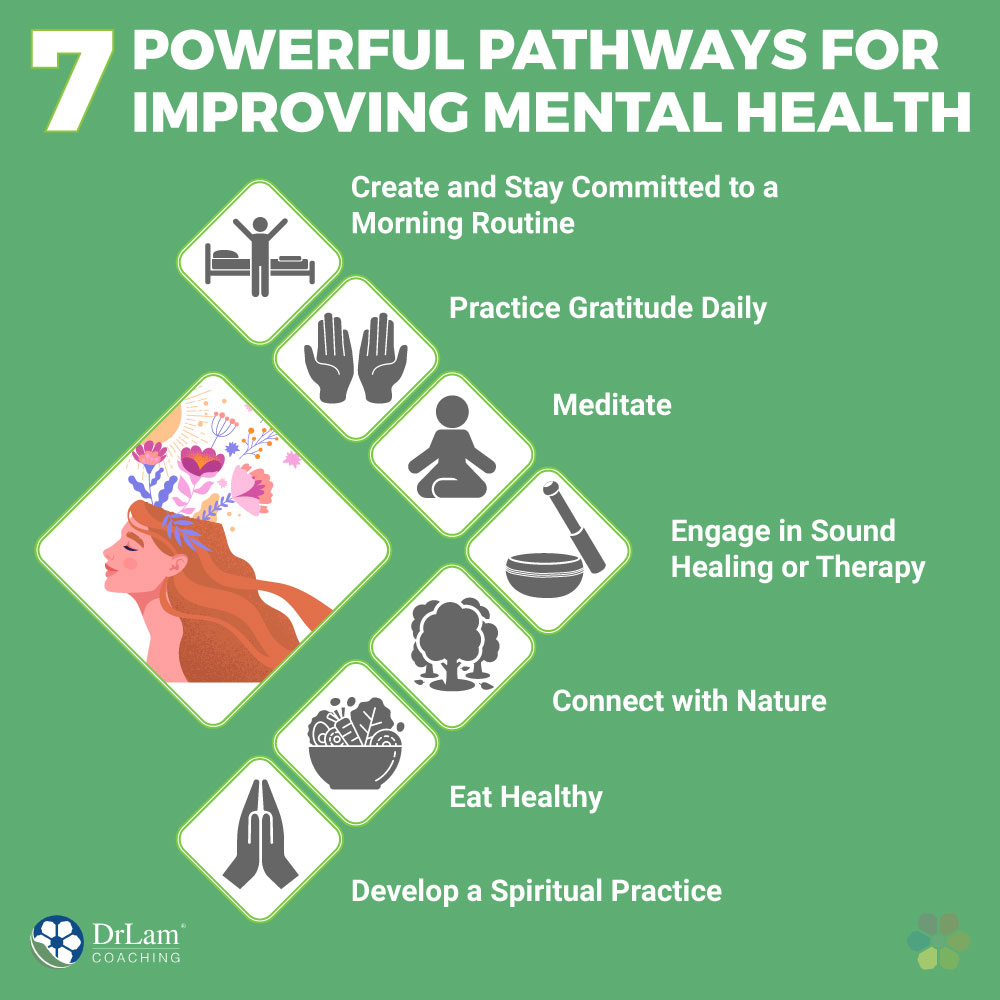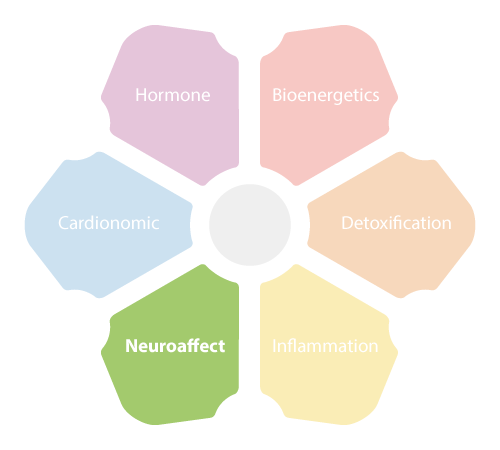“In the midst of movement and chaos, keep stillness inside of you.”
 We all suffer from mental health problems to some extent. This is because we are complex and holistic beings. The mind affects our emotions, just as our physical well being affects our thoughts, feelings, and sense of spiritual health and inner harmony. The mind, body, and spirit are an integrated and interconnected system. So how do we heal and restore our minds when we are prone to overthinking and self-destructive thought patterns and processes?
We all suffer from mental health problems to some extent. This is because we are complex and holistic beings. The mind affects our emotions, just as our physical well being affects our thoughts, feelings, and sense of spiritual health and inner harmony. The mind, body, and spirit are an integrated and interconnected system. So how do we heal and restore our minds when we are prone to overthinking and self-destructive thought patterns and processes?
The following are some excellent steps for improving mental health.
One thing that should never be underestimated is the power of routine. We all have unconscious habits in life. Habits are actions we repeat which, over time, become a part of daily life. All habits are unconscious to begin with.
Yet with conscious awareness, any and all habits can be transformed into a healthy and productive routine aimed to serve your highest interests. The key is to become more mindful and aware. Slow down and become the observer of your thoughts, daily habits, and behaviors. Meditation can really help with this.
The beauty of a morning routine is that you can adapt it to what works best for you. A morning routine can aid in improving mental health through the creation of helpful structures for you to stay committed to. There is a sense of alignment, keeping your mind and thoughts aligned and on course for your desired results. This is also a great way to help keep calm if you are under a lot of stress.
It is easy for the mind to drift and be pulled in many directions, and especially in such a hectic and fast-paced society. Yet with some focused intention and a morning routine, you can set yourself up for overcoming any repetitive or destructive mental patterns for the long-haul.
Gratitude is a powerful force. The physical universe as we know it is governed by natural laws and frequencies of emotion. Emotion is “force in motion”. It is through emotions that we ourselves become powerful shapers and creators of our realities.
We use emotion in every moment whether we are conscious of it or not. Empaths, for example, are so emotionally connected to others and the world around that they can merge with others on a distinct, subtle level. Just like dolphins communicate telepathically through their unique sonic radar, and snakes can sense sound waves through subtle vibrations emitted, we humans are also capable of higher frequency emotional functioning.
In terms of gratitude, this means we can reprogram ourselves with new patterns of thought and being through focusing on appreciation, saying thank you, and meaning it, on a daily basis. Genuine and sincere gratitude creates a force within and around us which has a profound effect on mental health and wellbeing.
 You may have seen many articles on the effect of meditation and mindfulness, so without going into too much detail… Meditation is possibly one of the most effective ways for improving mental health and becoming the healthy, happy, and stress- free being you aim to be. Why, you may be wondering?
You may have seen many articles on the effect of meditation and mindfulness, so without going into too much detail… Meditation is possibly one of the most effective ways for improving mental health and becoming the healthy, happy, and stress- free being you aim to be. Why, you may be wondering?
Meditation allows you to go within, still your mind, and become the observer of your thoughts. Not only does this calm your mind and introduce a new way of perceiving the world around you, daily situations, and difficult or stressful experiences, but it also has powerful effects on other levels of being. Through meditation, your emotions are positively affected, as are your inner currents, feelings, and belief systems. Furthermore, more oxygen is provided for the cells in your body, allowing for greater oxygenation and the reduction of stress.
In truth, there are so many studies and reports available for confirmation that an entire book could be written on this subject alone. The best place to direct you is to this fabulous article by Psychology Today for a rich and detailed list of sources to go to for accurate and carefully researched studies on the power of meditation and its effects.
“If you want to find the secrets of the universe, think in terms of energy, frequency, and vibration.”
This quote by Nikola Tesla sums up the importance of sound therapy perfectly. The whole universe is governed by sound waves and frequencies. Just as we are profoundly influenced by light rays, the power of sound should not go unnoticed.
There are many forms of sound healing or therapy available today and the benefits are becoming widely experienced and recognized. Binaural beats, therapeutic nature sounds, shamanic or tribal drumming, and Tibetan singing bowls, chimes, and shakers are all used by thousands of people around the globe. There are even such things as sound ceremonies and sound circles, where a variety of instruments are incorporated with drumming, gongs, chimes, and healing tones (solfeggio tuning forks), amongst others.
In essence, music or sound therapy generally makes you feel better, raising your inner vibration and wellbeing in the process. Through this, improving mental health becomes fun, something you see as a hobby or passion and not a chore.
 Nature is a healer. Regardless of whether you want to look at this scientifically or spiritually (from a holistic wellbeing sense), nature has restorative, rejuvenative, and regenerative properties. The air cleanses our minds and emotions, the waters of the world create feelings of inner peace, calm, and clarity, and the sun shines to empower us with vibrancy, self-expression, and empowerment. The earth also helps us to feel safe, secure, and connected to our own bodies and the world around us.
Nature is a healer. Regardless of whether you want to look at this scientifically or spiritually (from a holistic wellbeing sense), nature has restorative, rejuvenative, and regenerative properties. The air cleanses our minds and emotions, the waters of the world create feelings of inner peace, calm, and clarity, and the sun shines to empower us with vibrancy, self-expression, and empowerment. The earth also helps us to feel safe, secure, and connected to our own bodies and the world around us.
The natural world provides a grounding yet restoring and healing qualities. With regard to improving mental health, spend some time in nature, either through taking regular nature walks, doing some gardening, or contemplating your life, beliefs, feelings, and actions in a beautiful spot. The natural world can serve as great inspiration for life direction, future courses of action, and overcoming mental blocks, limiting beliefs, and thought patterns.
In the words of Hippocrates, “Let food be thy medicine and medicine be thy food.” The importance of food and diet for our mental health cannot be emphasized enough. We are complex and holistic creatures. Our physical vessel nurtures and nourishes us and has profound effects on our minds, emotions, and moods. Changing your diet to one rich in fresh fruits, vegetables, nuts and seeds, beans and pulses, herbs and natural components, and organic or whole foods, will shift your mental health significantly.
Foods which are good for us have a neurological effect in addition to a physiological one. In short, our neurotransmitters respond positively to healthy foods which work wonders on the body. This is especially true in adrenal fatigue, where the body is more sensitive and attuned to what you put in it.
Neurons are responsible for sending messages and signals to the brain and body; therefore, they have a direct effect on mental wellbeing and the nervous system. A change in your diet may just be the key you are seeking and to improving mental health.
 Finally, developing a spiritual practice is a powerful path for improving mental health. We often suffer conditions, problems, and imbalances because of a lack of harmony and balance. There are many distractions which keep us separated from our spirit, the natural world, and more empathic, compassionate, and spiritual ways of being. Yet, spirit is a part of life, just as all of our bodies’ systems are designed to work and interact in harmony.
Finally, developing a spiritual practice is a powerful path for improving mental health. We often suffer conditions, problems, and imbalances because of a lack of harmony and balance. There are many distractions which keep us separated from our spirit, the natural world, and more empathic, compassionate, and spiritual ways of being. Yet, spirit is a part of life, just as all of our bodies’ systems are designed to work and interact in harmony.
Developing a practice that supports this balance can go a long way towards improving mental health. For example, going on a spiritual retreat, learning a healing art, or simply developing a regular spiritual ritual like prayer, meditation, or meditative art or exercise can be very helpful.
Developing practices that support your mental health is of particular importance if your body has been struggling with chronic stress.

Stress is very common in today’s busy world, and while your body is designed to handle short term stress, when the stress becomes chronic and your body doesn’t have an opportunity to rest and repair, problems begin to develop.
When stress occurs, the prime responder is your adrenal glands, which produce cortisol, also known as “the stress hormone” to prepare your body to address the stressor. Your body sees no difference between the stress of a hungry tiger, a car accident, an angry spouse, or a personal phobia. It prepares you to fight or flee with a rush of hormones, but when the stress is over, the hormones need to subside so ordinary operations can resume. If the stress persists, eventually your body begins to run out of materials to make the hormones it needs to stay in high alert. This is when adrenal fatigue can occur. Adrenal Fatigue Syndrome (AFS) is a condition where your adrenals become fatigued, due to overworking to keep up with chronic stress. Your adrenals control many critical hormones in the body. All of your internal systems are affected if your adrenals are not performing optimally, meaning that some of the mental health problems you are experiencing could be due to AFS.
 Your adrenals help your body cope with stress through the NeuroEndoMetabolic (NEM) Stress Response. The NEM Stress Response is a biochemical orchestra consisting of six biological circuits, with three associated physiological systems within each. Each circuit plays a critical role in neutralizing stress, and together, they keep the body operating at its optimum. These six circuits are the Hormone, Cardionomic, Neuroaffect, Inflammation, Detoxification, and Bioenergetics circuits. The Neuroaffect circuit of the NEM Stress Response model is composed of the brain, autonomic nervous system, and the microbiome. The gut-brain-autonomic nervous system circuit relies on neurotransmitters to transmit and receive data (sensory information), and imbalances here can have a big effect on your mental health. Neurotransmitter imbalances are common with AFS, and they also commonly occur with mental health issues. Using some of the above suggestions to help rebalance your neurotransmitters could be the key to resolving some of your issues.
Your adrenals help your body cope with stress through the NeuroEndoMetabolic (NEM) Stress Response. The NEM Stress Response is a biochemical orchestra consisting of six biological circuits, with three associated physiological systems within each. Each circuit plays a critical role in neutralizing stress, and together, they keep the body operating at its optimum. These six circuits are the Hormone, Cardionomic, Neuroaffect, Inflammation, Detoxification, and Bioenergetics circuits. The Neuroaffect circuit of the NEM Stress Response model is composed of the brain, autonomic nervous system, and the microbiome. The gut-brain-autonomic nervous system circuit relies on neurotransmitters to transmit and receive data (sensory information), and imbalances here can have a big effect on your mental health. Neurotransmitter imbalances are common with AFS, and they also commonly occur with mental health issues. Using some of the above suggestions to help rebalance your neurotransmitters could be the key to resolving some of your issues.
If you are constantly tired, gain weight easily, or often get colds or the flu; if you lack energy, vitality, and motivation, experience lightheadedness and unclear thinking, or have an inability to handle stress, then you may be suffering from AFS. If this is the case for you, taking additional steps to address AFS could be a necessary part of improving mental health issues.
When it comes to improving your quality of life, working towards improving mental health through the seven methods in this article will not only see some of your health issues reduced, but will also aid in increasing your vitality, energy levels, and overall passion for life. If your mental health challenges involve mild depression, lack of inspiration or motivation, a loss of interests in life, new experiences and connections, or any disconnection from some aspect of yourself, taking some of the steps outlined here may help put you on the path to healing.
Movement and exercise can be very helpful in improving mental health and relieving fatigue in the process. When you engage in enjoyable physical activity, you are releasing trapped energy and letting go of mental and emotional blocks. A lot of what we store mentally is unconscious and due to stored thought pattern or beliefs. Movement can be healing!
